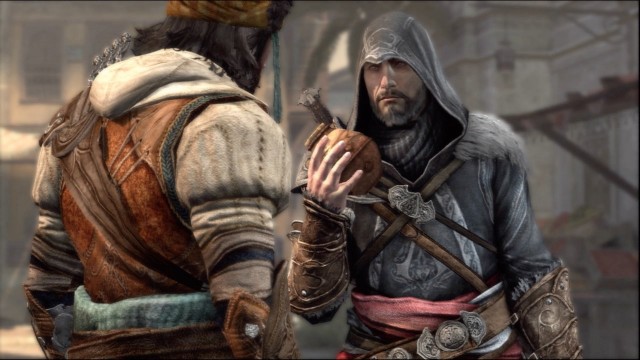Story is where Revelations thrives, for the most part
Taking place directly after the modern day events of Brotherhood, Desmond is left in a coma, his mind adrift in the Animus. The problem with the whole coma thing is that it completely removes the real-world component, the driving factor in the entire series. Desmond can occasionally hear Shaun and Rebecca discussing what’s going on in the real world, but these excerpts are few and far between. And what happened to Lucy? For such a major cliffhanger at the end of Brotherhood, regarding what is hands-down the franchise’s most important supporting character, all you have to do is blink and you’ll miss that resolution.
With no real-world foundation to ground Desmond’s reason for reliving Ezio’s memories, the game lacks a sense of urgency and scope that previous titles have all had. And the mind-bending conspiracy puzzles have also been removed, instead replaced with abstract, first-person platforming stages. It’s almost as if the developers played Valve’s Portal and said, “Hey, this is cool, let’s do something like this in our game…” The “Portal levels,” as I am now calling them and I suggest you do too, do offer up some meaningful character development for Desmond, but aside from the final stage the actual gameplay could have been replaced with a flight simulator or Just Dance demo and it wouldn’t have made any difference.
However, once I had finally completed all my side missions and had more money than I knew what to do with, it was time to see Ezio’s tale through to the end. And this is where I was reminded why Assassin’s Creed is one of the best franchises of the modern era. Revelations may be the weakest of the series thus far, but even still it shines brighter than most other games on the market. Particularly well-done is the evolving relationship between Ezio and the attractive Sofia, who helps him discover the whereabouts of the keys to Altaïr’s library in Masyaf, the game’s ultimate goal. Facial animations can be a bit wonky, but other than that the visuals are of a very high quality. And Revelations learns from Mass Effect’s mistakes: After unlocking a unique set of bullet-resistant armor with a faceplate, I was concerned that I would play the rest of the game (and any potential tender moments with my red-headed love interest) looking like a fully-suited samurai. But to my surprise, the faceplate was removed during these types of cutscenes, and left in others where there was no dialogue. A minor touch, but an extremely notable one nonetheless.
There seems to be less platforming action stages in Revelations, but what’s here is improved over previous entries. Taking a page out of the Uncharted book, environments are far more dynamic, falling apart as Ezio traverses them. There’s also a boat chase where Ezio must pursue fleeing Templar guards on foot, all while they’re firing rifles and igniting gun powder around him. These moments are unfortunately brief, but were definitely the highlights of the game for me, and a much-needed respite from the 10 hours of running around doing meaningless tasks that came before.
As I mentioned earlier, since Desmond’s version of these genetic memories varies depending on how the player executes them, there’s a bit of flexibility. The game enhances this by giving optional objectives that, upon being completed successfully, reward 100 percent synchronization. It’s an excellent way to offer not only additional challenge, but also replayability, as any memory, even side missions, can be retried at any time from the start menu. I just wish that finding all collectibles and having perfect synchronization had a greater reward. Brotherhood had a Raiden outfit, so is an Old Snake skin really too much to ask?
Lastly, Revelations is not just Ezio’s final chapter, but Altaïr’s as well, and through the Masyaf keys, both Desmond and Ezio are able to relive six of his memories. The first three are not particularly good, and demystify what was already the less interesting of the two playable ancestors. Only through legend and whispers was Ubisoft able to make the original Assassin’s Creed hero a compelling entity. But the second half do an excellent job of wrapping up not only Altaïr’s story, but seemingly Ezio’s as well, tying both threads together in a meaningful and fulfilling way. Ezio’s story ends a little too abruptly, though, leaving some questions unanswered, but once again Assassin’s Creed has provided some of the most memorable story-driven moments in video gaming history.

